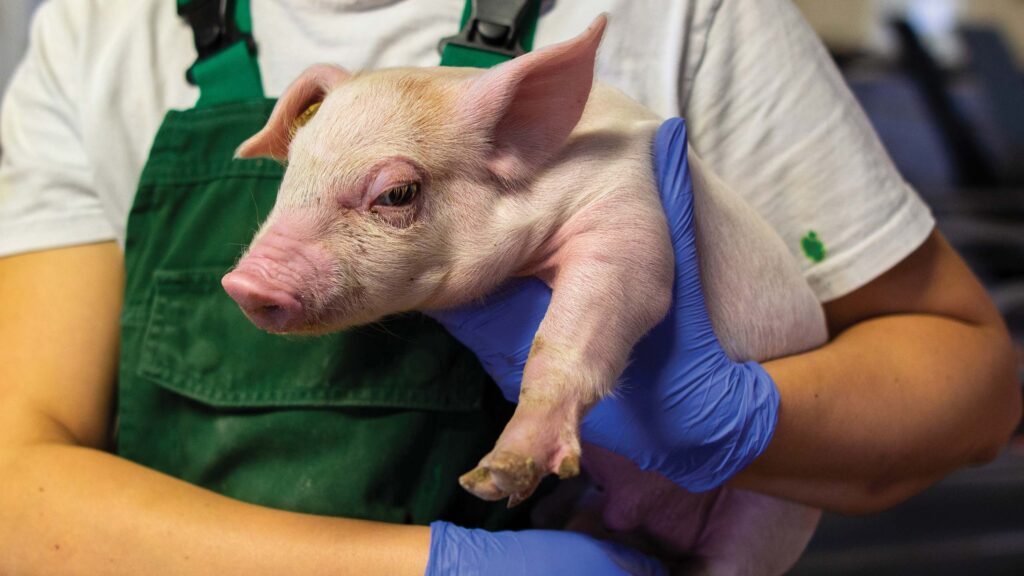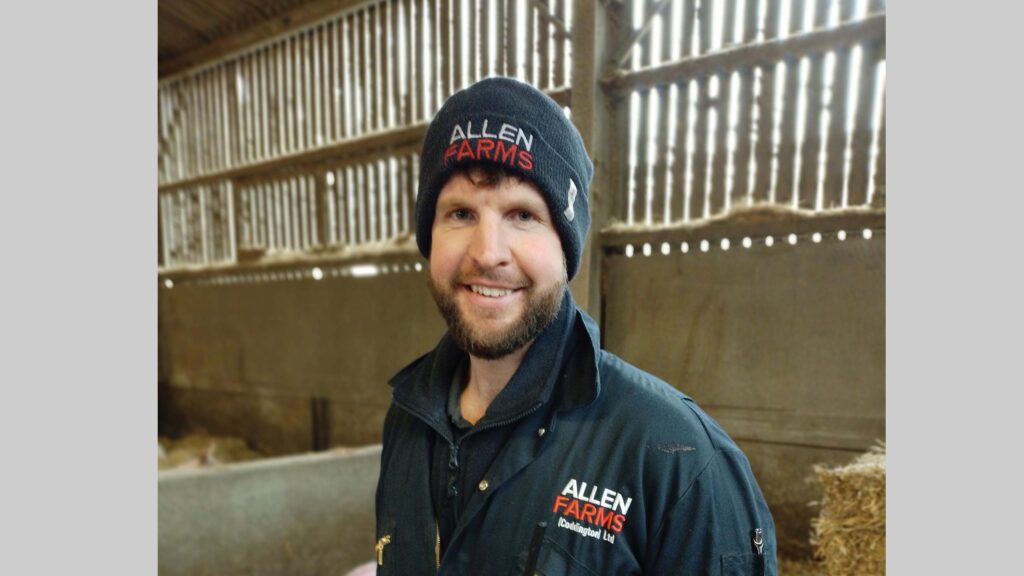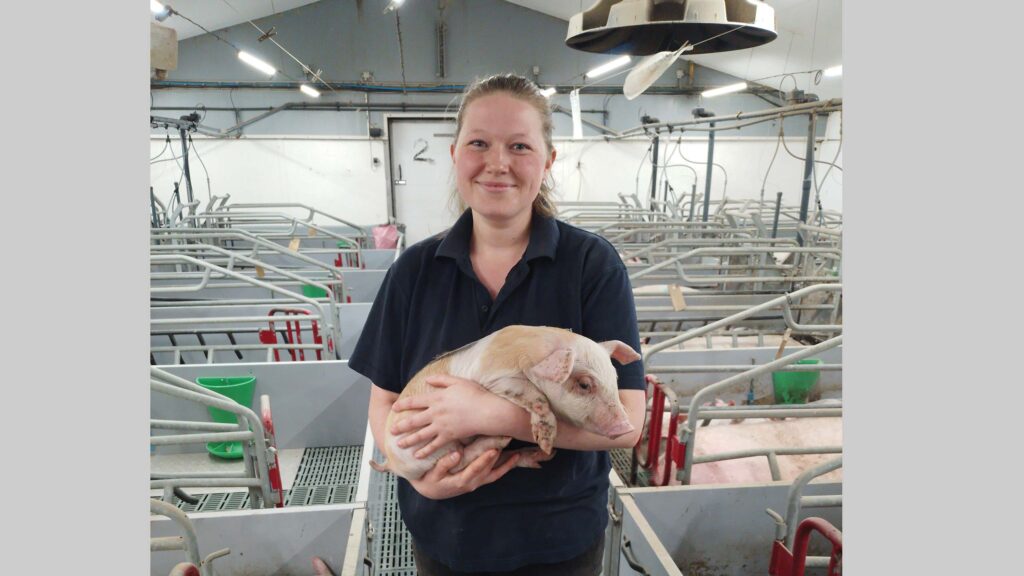Ways two pig units build and develop their staff teams
 © Adobe Stock
© Adobe Stock A post-Brexit reduction in migrant labour, misconceptions about farming careers, and changing expectations of working life are among the factors hampering pig farmers’ efforts to find and keep good-quality staff.
However, there are many steps they can take to make this vital task less of a struggle.
Two producers share some practical examples they have put in place on their farms.
See also: 6 ways to find – and keep – staff on pig farms
Allen Farms (Coddington), Nottinghamshire

Fred Allen © Helen Brothwell
Farm facts
Allen Farms, Nottinghamshire
- 850-sow indoor farrow-to-finish herd
- Seven full-time staff members and one part-time
- Part of a mixed family farm, with arable, sheep and feed mill enterprises
- 30 pigs weaned a sow a year
Fred Allen prioritises openness and communication on the pig unit he manages as part of a mixed family farming partnership.
“I keep everyone informed about how the business is doing, and I go out of my way every day to make sure we all sit down together as a group at morning break,” he explains.
“We have a 15-minute catch-up on how everyone is, then 15 minutes discussing how the day before went and planning how we’re going to complete the current day’s tasks.
“Everyone is included and encouraged to speak and to listen respectfully to each other. While it may not be their name over the farm gates, I consider it to be their farm too.”
Fred is currently preparing to build new, more efficient sow accommodation. Next year, a new staff welfare building including showers is planned.
He asked staff to vote for which of these should be built first, and they chose the sow accommodation.
Existing staff facilities comprise a toilet, sink with hot water, a washing machine and a cabin with air conditioning and heating.
Weekday working hours are 6.30am to 4pm, while weekend shifts are 7am to 11.30am. All staff work only one weekend in three.
Staff appraisals
Fred says the introduction of annual staff appraisals has been very helpful.
“If there are issues, they always come out in the wash when proper time has been set aside to talk.
“Problems are commonly linked to their home lives, which is important for us to be aware of, as it usually explains their mood and commitment to work,” he explains.
“I also encourage my team to give me constructive criticism and suggest what they think we as a business should be improving.”
The appraisal and pay review meetings are now scheduled for each January, as morale tends to dip in the winter.
Holding them early in the new year helps motivate staff to keep going during the trickier months.
“It’s difficult, but you must try and not feel too defeated when people are off work or decide to leave. Generally, though, we’ve got quite a happy camp,” Fred adds.
He strongly believes in developing every team member.
“Each year, every employee is given three personal targets to work towards. These are tailored to the individual and their role within the team, and I will help them with these.”
Many of the team have also benefited from pig husbandry training or management courses, either in person or online.
When recruiting, Fred tries to make sure people are going to fit in with the team and enjoy the work. Even so, roughly one employee a year leaves the farm.
He has previously paid recruitment agencies to find suitable people, but problems still surfaced over time.
“We now use Indeed and forward the advert link to a local online farming group. We make our job adverts concise, punchy, and really try to sell ourselves, including things like new buildings or award wins.”
Crockway Farms, Dorset

Martin Atkin (top left) celebrates with staff from the Philippines after a basketball match © Martin Atkin
Farm facts
Crockway Farms, Dorset
- 3,400-sow indoor unit, part of JMW Farms
- Pigs reared on-site up to 37kg
- 17 full-time staff plus one part-time
- 38 pigs weaned a sow a year
Pig unit manager Martin Atkin and his farrowing department manager Clemmie Milton prioritise being approachable, looking after people and paying well.
They now have a competent and settled team at Crockway Farms in Dorset (part of JMW Farms) and have found people by advertising through Indeed.
However, it has taken time and patience: for every 10 people invited for interview, as many as nine do not actually turn up.
The interview process has helped to ensure the right people are recruited.
“During job interviews, we always try to keep it light-hearted,” says Martin. “We ask the important questions but also want to show that we’re human.”
Honesty from the outset is key: they run through everything that will be expected in the role during the interview, so recruits are not surprised after starting the job.
Their employees come with varied previous experience and currently include a tractor driver and a care home worker. The team also includes several people from the Philippines.
Staff training
The farm operates a “buddy” system for new starters to help them settle in, and puts a lot of time into training stockpeople in pig health, welfare and performance.
Martin says: “As a manager, it is important to be out on farm as much as possible and be approachable to people, helping, showing and teaching.
“Also, if someone has an idea, I nearly always let them try it.”
There is no blame if something goes wrong or there is any conflict, and a good conversation will solve it 70-80% of the time, he adds.
“We take our time to understand what’s going on. We don’t shout or get angry; we show them how we’ll do it differently next time.”

Clemmie Milton © Helen Brothwell
Clemmie acknowledges that it is hard not to take home any challenges, but over time she has learned not to take things to heart too much.
The working day runs from 6am to 4pm, Monday to Friday. However, they are aiming to change this to 6am to 3pm. Employees work one weekend in three, and for shorter hours.
Total staff numbers have increased slightly, with two more people now employed to cover the rota.
Working environment
Showering in and out is part of the unit’s biosecurity. The purpose-built shower facilities, combined with a modern canteen area, have also contributed to a good working environment.
Mobile homes are provided on-site for some employees and are kept in good repair.
Any farm equipment broken is quickly replaced, and work clothes are kept clean and tidy, with washing machines on site.
Martin and Clemmie also help build good working relationships and morale by organising social activities for the team.
Recent events have included a barbecue, a wellie-wanging competition and basketball matches, and a deep-sea fishing trip is planned.
“We are fortunate that our manager and CEO back us in all we do and realise that staff happiness is really important,” says Martin.
Farmers’ top tips for recruiting and retaining staff
- Prioritise open communication
- Encourage new ideas and keep everyone included
- Avoid blame and focus on solutions
- Set reasonable working hours and time off
- Invest in good facilities and equipment
- Offer good pay
- Plan career development and offer training
- Try not to take difficulties personally
Source: Fred Allen, Martin Atkin and Clemmie Milton
